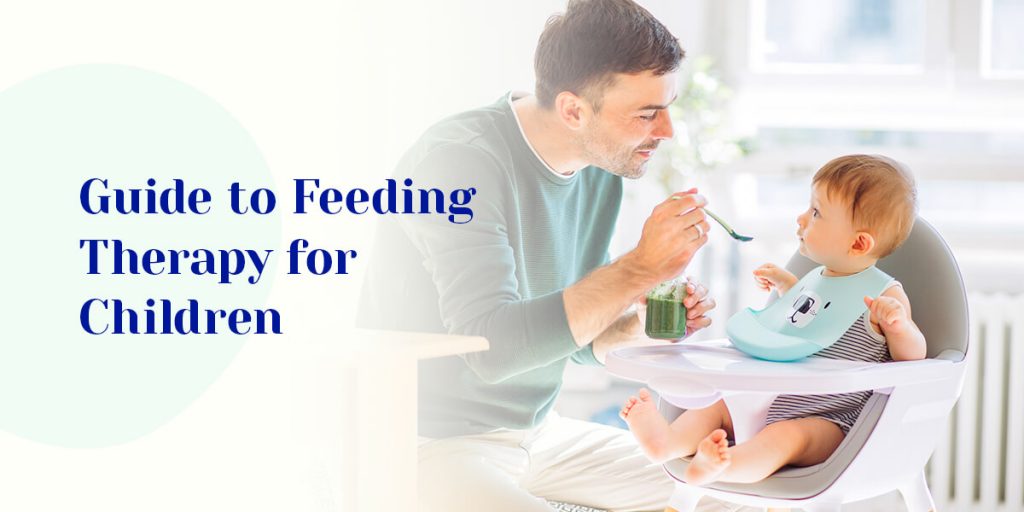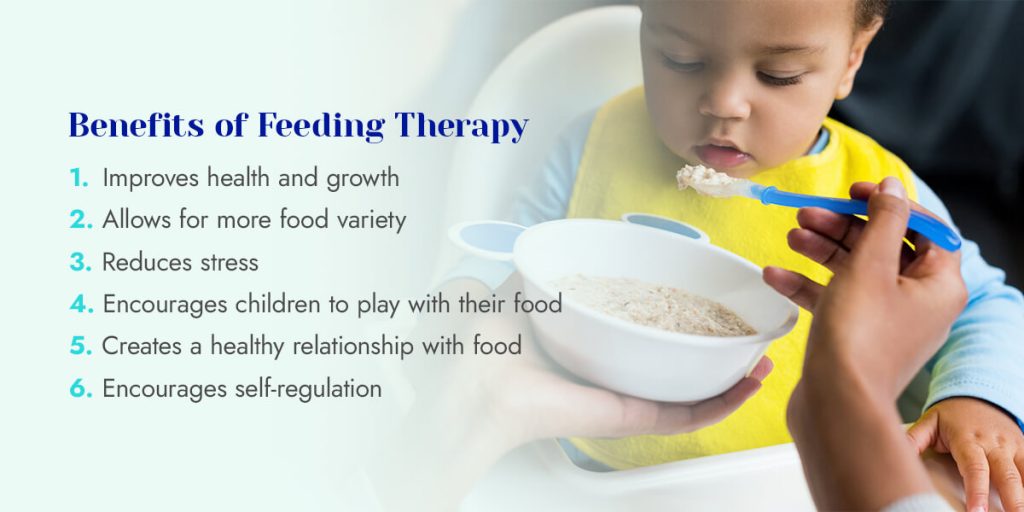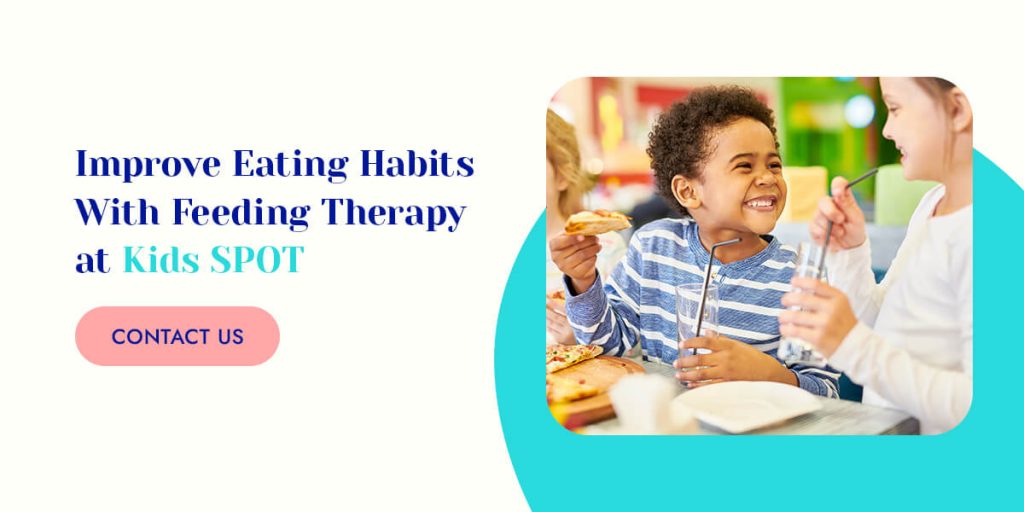Guide to Feeding Therapy for Children
If your child gags or spits out food during mealtime, they might be a picky eater. Or, certain conditions may mean your child has trouble eating or drinking. If your child refuses to eat or simply has trouble eating, feeding therapy can help.
Feeding therapy is meant to improve a child’s relationship with food and improve their motor skills to self-feed. Learn more about feeding therapy below and how it can enhance your child’s quality of life.
What Is Feeding Therapy?
Feeding therapy is a form of occupational and speech therapy that teaches young children how to eat or eat better. Feeding difficulties often arise from various conditions such as sensory processing disorder or autism spectrum disorder. Breathing difficulties, such as asthma, and nervous system disorders, such as cerebral palsy, can also create challenges with eating. These conditions can make it difficult for children to swallow and cause aversions to food. Feeding therapy can address these concerns.
This type of therapy is often included under speech therapy services. A feeding therapist will determine how often your child should attend therapy sessions and how long those sessions will be. Feeding therapy can make mealtime easier for parents and reduce stress surrounding meal preparation. Feeding therapy for toddlers can help them get the vitamins and nutrients to encourage healthy growth.
Feeding Therapy for Picky Eaters
A picky eater is a person who refuses to eat certain foods. If your child is a picky eater, they might eat the same things repeatedly, such as chicken nuggets, mac and cheese, or grilled cheese. Toddlers who are picky eaters might experience nutritional deficiencies if they aren’t getting enough sustenance from their current diet, impacting their growth and development.
Picky eating might begin when your child is a toddler and peak once they reach preschool age. You can look to feeding therapy to help your children overcome picky eating habits. Feeding therapy can improve your child’s relationship with food and motivate them to try new food groups.
Benefits of Feeding Therapy for Children
If you’re considering enrolling your child into feeding therapy, the potential benefits include:
- Improves health and growth: Children with difficulty eating can also experience difficulty maintaining an appropriate weight for their height and age. Establishing healthy eating habits can improve your child’s nutrition, which is essential for healthy growth and development.
- Allows for more food variety: Children who have food aversions have a limited diet. Feeding therapy can increase their exposure to new foods, expanding the number of options during mealtime. This allows you to be more flexible when preparing meals for your children.
- Reduces stress: If your child doesn’t eat a lot of variety, mealtimes can be stressful, as you have to worry about making a nutritional meal your child will actually eat. You may also have to make more than one meal for your child and the rest of your family. Feeding therapy can help your child become more comfortable with various foods, saving time during meal prep and reducing the number of meltdowns.
- Encourages children to play with their food: While some parents might think that playing with food is counterproductive or bad table manners, children who play with their food develop essential skills and become more comfortable with various sights, tastes and textures. Feeding therapy encourages children to play with their food to spark their interest in new meals they might have had an aversion to before. If a child is comfortable with their food, they can become more likely to eat it.
- Creates a healthy relationship with food: Feeding therapy can help create positive associations with food, replacing negative experiences or associations that may be causing your child’s aversion. Their feelings of trust and safety around new food can increase, encouraging them to explore new foods at their own pace.
- Encourages self-regulation: Feeding therapy helps your child build the skills necessary to manage their emotions through self-regulation. They can observe and learn how others eat and react to food through shared connections and a calming environment. Once they’ve developed these skills, they can soothe themselves when they come across unfamiliar foods or tastes. If you remain calm and peaceful during mealtime, your child can learn to do the same.
What Skills Will Your Child Work on in Feeding Therapy?
While your child participates in feeding therapy, they’ll work on various skills with a feeding therapist, such as:
- Oral motor skills: Children with developmental delays or conditions can experience coordination problems. A feeding therapist can help address muscle development, breathing functions and specific movement patterns to facilitate healthy eating habits. Your child can overcome these delays and improve their oral motor skills.
- Sensory sensitivities: Some children experience sensitivities to certain textures or sensations from various foods. These sensitivities can be caused by medical conditions or develop on their own. Feeding therapy will introduce your child to multiple sensations in a positive environment to improve their reactions to different foods.
- Food orientation: Often, children need help to broaden the types of food they eat. In feeding therapy, the therapist will work with you and your child to increase foods they can eat through exposure. They’ll learn how to manage their sensitivities and regulate their emotional responses to unfamiliar textures and tastes.
A feeding therapist will utilize various equipment, tools and therapeutic methods to help your child develop self-feeding skills and improve their diet.
8 Signs a Child Could Benefit From Feeding Therapy
If your child is struggling with eating, they could benefit from feeding therapy. There are several signs you can look for, including:
1. Has Difficulty Chewing and Swallowing Food
Certain conditions, such as asthma and cerebral palsy, can cause problems with chewing or swallowing, which feeding therapy can help address.
2. Refuses to Eat Certain Food Textures
Children with autism or sensory processing disorders can have an aversion to food textures. Feeding therapy can help your child adjust to unfamiliar textures or sensations, improving their relationship with food.
3. Struggles to Control and Coordinate Food in the Mouth
Certain conditions, like nervous system disorders or muscle weakness, cause coordination problems and make it challenging for children to eat. Feeding therapy can help your child strengthen the appropriate muscles to improve their eating habits.
4. Gags and Chokes While Eating
Gagging or choking can be a sign of a medical condition or food aversion. Feeding therapy can help determine the cause and move forward with the appropriate treatment to reduce these types of reactions to food.
5. Pushes Food Away
If mealtime comes around and your child pushes away their plate or pushes certain foods to the side, they may have a food aversion. Feeding therapy can benefit your child by introducing them to new foods and creating positive associations.
6. Vomits Frequently During or After Meals
Vomiting after eating can be a sign of acid reflux or food aversion. Chronic acid reflux can cause a child to avoid foods that cause vomiting or other uncomfortable feelings. Participating in feeding therapy can help your child find relief and learn how to overcome their aversions.
7. Has Difficulty Coordinating Breath Patterns During Bottle or Breastfeeding
Infants who experience breathing problems when eating could have a medical condition, such as asthma. Feeding therapy can help you get to the bottom of this reaction and determine the best course of action to improve feeding habits.
8. Gags on or Is Sensitive to Certain Textures, Temperatures or Flavors
Sensitivity to certain textures could indicate a sensory problem. If your child refuses to eat because of these qualities, feeding therapy can teach them how to overcome the discomfort associated with certain textures and increase their exposure to new foods.



